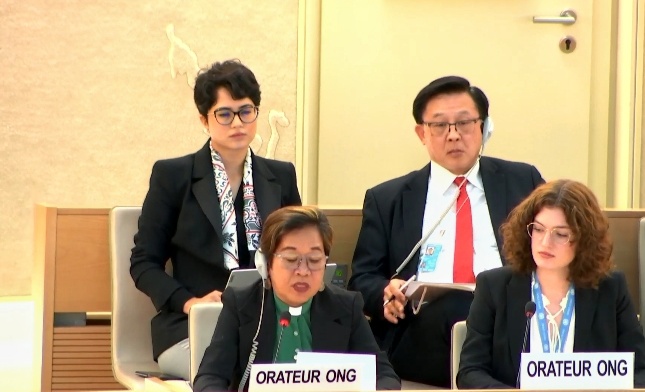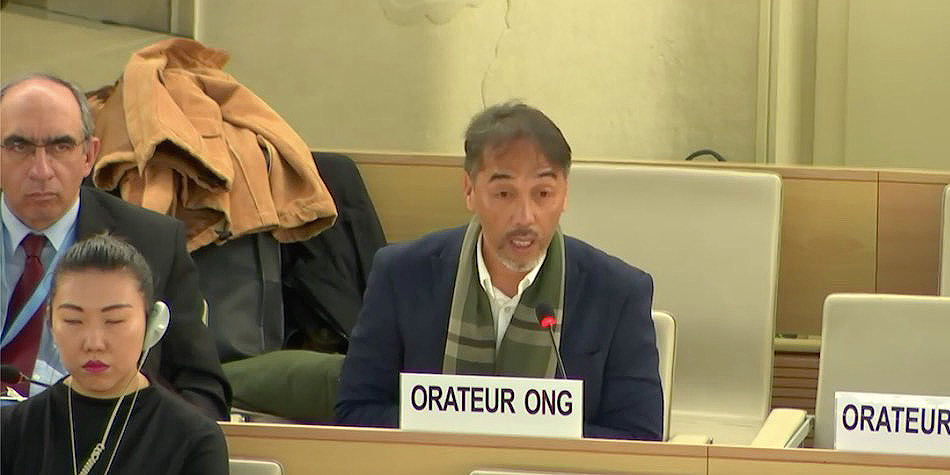Methodist pastor tells UN of PH government harassment using anti-terror law
GENEVA, Switzerland—A Filipina clergy spoke before the ongoing 55th regular session of the United Nations Human Rights Council (UNHRC) in this city complaining of trumped up charges against her by the Philippine government using the Philippine Anti-Terrorism Act (ATA, Republic Act No. 11479) of 2020.
United Methodist Church (UMC) Pastor Glofie Baluntong said both the Rodrigo Duterte and Ferdinand Marcos governments use the ATA and other repressive laws in the Philippines to harass human rights defenders
At the UNHRC’s discussion of the report of the Special Rapporteur on the promotion and protection of human rights and fundamental freedoms while countering terrorism Ben Saul last Tuesday, March 12, Baluntong narrated that on June 17, 2019, Philippine National Police forces barged into her church compound in Roxas, Oriental Mindoro without a court-issued warrant, demanding she surrender of Karapatan Southern Tagalog members she was hosting. She was then accused of aiding alleged rebels, she added.
“Since then, I have endured harassment, intrusive visits, and questioning by the Armed Forces (of the Philippines),” she revealed.
Rev. Baluntong, also a member of the National Council of Churches of the Philippines, also told the international body that she was subsequently charged by the Philippine government of attempted murder on August 18, 2021.
“[They cited] an armed encounter that allegedly occurred on March 25 of that year—a day on which I was conducting funeral rites for a departed church member,” Baluntong told the UN.
“I was also wrongfully charged with [violation of] the Anti-Terrorism Act of 2020, and grave threats from state forces have forced me to flee my town,” she added.
Baluntong’s testimony at the UNHRC discussion followed former senator Leila de Lima’s own intervention via video, narrating her seven-year ordeal as a political prisoner for her opposition to Duterte’s bloody drug war.
Baluntong called upon UN member states, including the Philippines, to heed Saul’s recommendations to ensure that counter-terrorism laws and practices, including efforts to combat terrorism financing, respect human rights.
Baluntong said that governments must make sure they do not curtail the legitimate activities of civil society organizations, impede civic space, or hinder humanitarian endeavours.
“Saul’s report testifies to my own lived experience,” Baluntong said.

Increasing number of cases
Meanwhile, rights group Karapatan, a member of the Philippine UPR (Universal Periodic Review) delegation attending the ongoing UNHRC session here said at least 27 individuals have been charged by the Philippine government of violating the ATA.
These are in addition to several Islamic groups charged as terrorists groups under the ATA and the Terrorism Financing Prevention and Suppression Act of 2012 (Republic Act No. 10168).
“Charges under ATA against three political prisoners had been dismissed, but they remain in jail due to other trumped up criminal charges. Eight political prisoners who were detained and faced charges under Republic Act No. 11479 had been released,” Karapatan legal counsel Atty. Ma. Sol Taule said.
The constitutionality of the Philippine Anti-Terrorism Act of 2020 had been contested by 47 petitions before the Supreme Court that in turn struck down some of its most questionable provisions.
The high court however deferred judgement on other contested points citing lack of actual injury pending it’s the law’s full implementation.
“There has been no reported conviction under both laws strongly indicating the infirmities of the trumped up charges and of the law itself,” Taule said. # (Raymund B. Villanueva)
[DISCLOSURE] The reporter is a member of the PH UPR Watch delegation as chairperson of the People’s Alternative Media Network that also spoke with UN special rapporteur on freedom of expression and opinion Irene Khan during her visit to the Philippines earlier this year.




